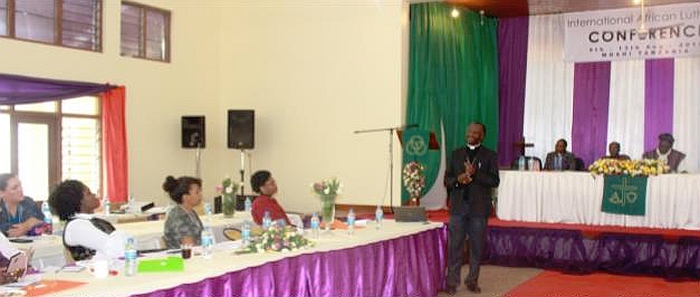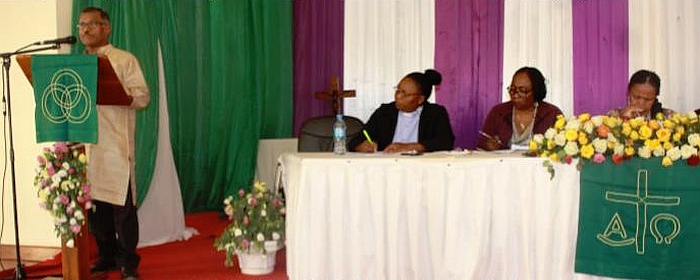ELCT
Press Release
Date:
September 10, 2018
Press release No. 001/09/2018
‘Ubuntu’ philosophy needs to be Christ centered
“Acts of humanness have to be Christ-centered to avoid selfishness through the tendency of segregating others in the process of unifying one’s own community,” Rev. Dr. Fidon Mwombeki, the General Secretary of All Africa Conference of Churches (AACC), said in a presentation at the first International African Lutheran Conference (IALC) held in Moshi, Tanzania recently.

Rev. Dr. Fidon Mwombeki
presenting a keynote address on the theme of the conference - “Ubuntu:
I Am Because We Are.”
On the theme of the conference, “Ubuntu: I Am Because We Are,” Dr. Mwombeki defined ‘Ubuntu’ philosophy to mean humanness saying: “The best ground to understand ‘ubuntu’ is the Gospel as it embraces the universality of the term. When we see in people’s eyes and hearts the image of God and their dignity, that is what I call ubuntu,” he said.
“It is like seeing the image of God in people irrespective of culture, economic status, racial, tribal, faith and ethnic considerations. The Gospel transcends culture allowing people to judge everything by the way dignity of every human is preserved and honored. And if a certain culture goes against that, it must be fought,” he said.
Reacting to a question on how comes the Gospel was misused during apartheid and slave trade, he said there was nothing wrong with the Gospel which need to be differentiated from bad theology. He said apartheid and slavery were propped up due to bad theology and urged the Church to fight bad theology.
Rev Mwombeki pledged, as the new Executive Director of AACC, come January 2019, that he would take steps to address bad theology propagated widely now in Africa by instilling fear in people. People are made to believe that everything in their past and present life is negatively affected by witchcraft he said without giving details.
Dr. Mwombeki implored the church to serve and unite people instead of segregating those who are not part of their communion. He also wished that participants would respect everyone’s thinking, ideas and words in order to live out the notion of “Ubuntu: I am because you are.”
Bishop Dr. David Tswaedi, the Executive Director of Lutheran Communion in Southern Africa (LUCSA), said people in South Africa started using the notion of “Ubuntu: “I am because you are” in trying to answer how to deal with a broken society at the end of the apartheid system. He echoed the hurt and suffering experienced by some of the participants when he said under the apartheid regime in South Africa majority of the people were dehumanized, their dignity taken away, their freedom delayed and denied.
The Director for Theological Education for Emerging Ministries in ELCA, Rev. Dr. Moses Penumaka, said what was described by Dr. Mwombeki as bad theology, is the one that is not liberating. Theological education, he said, could help people differentiate between the Gospel, that is empowering and liberating, and theology that could destroy or disconnect people.

Dr. Penumaka (standing)
was among panelists who discussed the presentation by Dr Mbowe seated
left. Other panelists were Ms Jessica Kamala Mushala from ELCA Metro
New York Synod and Ms Toromare Mananato from Madagascar. Not in the
picture is Bishop Dr.David Tswaedi from Lutheran Communion in Southern
Africa.
In her presentation under a sub theme: “A Community of Faith in African Context”, Rev Dr. Hoyce Mbowe from Tumaini University - Dar es Salaam College, said Ubuntu notion was confined to the tribe and clan and not to the entire community as the clan considered its self as unique.
She agreed with Dr. Mwombeki that those who were not members of a certain ethnic group or tribe had no connection with other groups; that is why there were tribal and clan wars in Africa whereby prisoners of war were used or sold as slaves.
Dr. Mbowe said: “The spirit of ‘ubuntu’ of sharing and supporting each other is no longer vivid in people’s lives in African society today. Ubuntu is only practiced at family level where members share and care for one another and not beyond that,” she said.
She said although Africa was endowed with valuable natural resources, few people benefit while the majority are among the poorest people in the world. She pointed out that there was rampant corruption, nepotism, injustices and squandering of natural resources on the African continent. Some of the beneficiaries of squandered resources were members of the Christian family. Dr. Mbowe said “people with ubuntu should be different. They are supposed to share, be open and available to others. Africa needs to revise and embrace the sharing and caring characteristics found in the early African ‘ubuntu’ and in the early Christianity communities.”
She said people who used to be inter-connected through their ethnic groups were now being connected through the church; which they see as a community of faith doing things which show solidarity and care for others.
Dr Mbowe said through its mission outreach of spreading the Gospel to those who have not been reached by the Good News; the church in Africa was growing fast and it is predicted that by 2050 one-third of Christians in the world will be living in Africa.
Despite the tremendous growth, she pointed out, there were challenges such as bad news about wars, refugees, injustice, poverty, disunity and domestic violence mainly against women and children that have become routine, she said adding that among culprits and victims are members of the church. She said so far the Church has not done enough to address those challenges.

Dr. Penumaka who originally comes from Asia said: “A context that is transforming, empowering and liberating, is God’s context and our context in which we are called to be the people of God. Through his death on the cross Jesus created a new humanity thus destroying that which divides us.”
To read an earlier article on: The First International African Lutheran Conference has been launched click here.
Elizabeth Lobulu
Communication Coordinator,
Evangelical Lutheran Church in Tanzania
Box 3033, ARUSHA, Tanzania.
Phone: +255-27-250-8856/7
FAX: +255-27-254-8858
E-mail: ELobulu@elct.or.tz
For more information contact:
Elizabeth
Lobulu
Communication Desk Officer, ELCT
E-mail: ELobulu@elct.or.tz